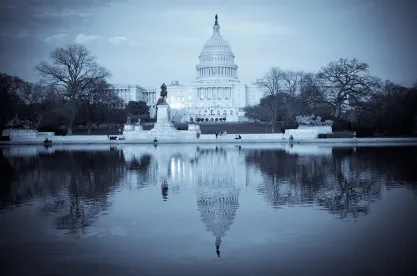For the first time since early 2020, the dominant topic in the American policy debate is not the COVID-19 pandemic. With national attention consumed by protests, riots and the state of race relations in the United States, efforts continue in Washington to stabilize and stimulate an American economy that was brought to a screeching halt months ago in an attempt to limit the coronavirus’ spread.
Senate Majority Leader Mitch McConnell (R-KY) has announced he will seek unanimous consent in the Republican-led US Senate for quick approval of legislation passed with overwhelming bipartisan support last week in the Democratic-controlled US House of Representatives that will make changes to the Paycheck Protection Program (PPP) created by the March 27 Coronavirus Aid, Relief and Economic Recovery (CARES) Act. Leader McConnell’s move is an indication that Senate Republicans, including Senate Committee on Small Business Chairman Marco Rubio (R-FL), have decided they can accept the House-passed measure as written so that it can be quickly sent to the president to be signed into law. Chairman Rubio had previously signaled that he would seek to change the bill to address concerns he had about the way in which some provisions had been drafted.
House Democrats, led by Committee on Transportation & Infrastructure Chairman Peter DeFazio (D-OR), will unveil major infrastructure legislation this week to reauthorize the nation’s surface transportation programs, according to POLITICO. House Committee on Ways & Means Chairman Richard Neal (D-MA) has indicated the surface transportation bill and other economic recovery measures are being readied for consideration on the House floor in late June or early July, when they may also become a factor in the bipartisan negotiations that are expected to have begun by then over the next major federal COVID-19 response bill. The House weeks ago passed the US$3 trillion Health and Economic Recovery Omnibus Emergency Solutions (HEROES) Act on a party-line vote, setting forth congressional Democrats’ primary marker for the eventual talks.
Unemployment and back-to-work measures will be among major topics of discussion for Congress when the COVID-19 negotiations commence later this month. Law360’s Alan Ota reports that Chairman Neal expects the consensus bill that is ultimately negotiated by Republicans and Democrats this summer will include both enhanced unemployment relief measures and incentives to support individuals who return to work. Leader McConnell has indicated the GOP will oppose an extension of the enhanced unemployment benefits established by Congress this spring in response to the pandemic-related shutdown. Senator Rob Portman (R-OH) has proposed a “back-to-work” bonus that would provide hundreds of dollars in additional money to individuals who return to the workforce, in addition to the wages they are paid.
The nonpartisan Congressional Budget Office (CBO) projects it could take nearly a decade for the American economy to recover from the lockdown imposed this spring in response to the pandemic, the Wall Street Journal reports. CBO’s calculations were made prior to the current outbreak of civil unrest in America, a development some fear could usher in a new wave of coronavirus cases in cities across the country.
Tax and Economic Development Updates
Despite initial concerns about certain aspects of the House-passed bill that would extend the PPP and provide loan recipients with additional flexibility in spending their loan proceeds, it appears that the Senate may in fact consider the legislation as is this week. Yesterday, Senate Majority Leader McConnell stated on the Senate Floor: “I hope and anticipate the Senate will soon take up and pass legislation that just passed the House by an overwhelming vote of 417-1 to further strengthen the Paycheck Protection Program so it continues working for small businesses that need our help.” From our understanding, Senate leadership planned to run a hotline on the bill yesterday to confirm that the Upper Chamber would be able to pass the legislation through unanimous consent this week.
As lawmakers are taking action in support of small business financial assistance, they are at the same time expressing concerns about other financial assistance programs established under the CARES Act. For example, in response to a letter led by Senators Elizabeth Warren (D-MA) and Jack Reed (D-RI) regarding Delta Airlines’ decision to cut their employees’ hours after receiving payroll support, CEO Edward H. Bastian affirmed his position that Delta is in “full compliance” with the CARES Act requirements. There are also concerns regarding the implementation of financial assistance provided under the CARES Act for state and local governments. According to a report by the National League of Cities, 32 states have yet to distribute funds to local governments. As such, House Committee on Ways and Means Ranking Member Kevin Brady (R-TX) has introduced H.R. 7065, which would require states to make a certification by June 12, 2020, that they have a process in place for redistributing a portion of their funds to local governments within their jurisdiction or face having the Inspector General of the Treasury Department claw back 25% of the funds provided to the state.
Ranking Member Brady has also introduced the Reopening America by Supporting Workers and Businesses Act of 2020, which is intended to “help local businesses rebuild their workforce quickly by turning these unemployment benefits into a back-to-work bonus that will provide a bump to workers and help accelerate our economic recovery.” Specifically, H.R. 7066 would: (1) allow workers, through July 31, 2020, to keep up to two weeks of expanded unemployment benefits after accepting a job; (2) permit employers to report job refusals and provide clear notice to unemployment claimants about return to work obligations and good cause exceptions; and (3) clarify that non-profits are not required to pay the full amount of unemployment benefits and wait for reimbursement, but can instead reduce the amount owed up-front. Ranking Member Brady’s bill is but one of several ideas being discussed as an alternative to the expanded unemployment benefits enacted in response to the COVID-19-induced economic crisis, and comes as both House Speaker Nancy Pelosi (D-CA) and Senate Minority Leader Chuck Schumer (D-NY) have expressed support for automatic triggers that would link the length of these expanded unemployment benefits with economic conditions.
Finally, as we look ahead to the next COVID-19 relief bill, it is important to note the context in which it will be considered. Specifically, the Congressional Budget Office (CBO) yesterday announced that the current public health crisis is likely to reduce domestic cumulative nominal Gross Domestic Product by US$15.7 trillion – or more than five percent – over the next 10 years. The CBO also indicated that the House-passed HEROES Act would actually cost US$3.5 trillion – an estimate that is nearly US$500 billion more than initial projections. Given concerns over the ever-increasing national debt, a bipartisan group of approximately five dozen House Members has sent a letter to leadership urging Congress not to “ignore the pressing issue of the national debt, which could do irreparable damage to our country.” In the letter led by Representatives Scott Peters (D-CA) and Jodey Arrington (R-TX), lawmakers “request that further pandemic-response legislation include provisions for future budget reforms to ensure we confront these issues when the economy is strong enough.”
Health Updates
The Centers for Medicare & Medicaid Services (CMS) released data on COVID-19 cases in nursing homes yesterday, and it will post underlying data collected by the Centers for Disease Control and Prevention (CDC) via a link on Nursing Home Compare later this week. According to CMS, about 80% of Medicare and Medicaid nursing homes reported required data to the CDC by the end of last month. The agency states, “These facilities reported over 60,000 confirmed COVID-19 cases and almost 26,000 deaths. Of the nursing homes that reported data, approximately one in four facilities had at least one COVID-19 case, and approximately one in five facilities had at least one COVID-19 related death. Early analysis shows that facilities with a one-star quality rating were more likely to have large numbers of COVID-19 cases than facilities with a five-star quality rating.” CMS said it will take action against nursing homes that have not reported data to the CDC. The agency plans to enhance enforcement for facilities with persistent infection control violations, and it will also impose enforcement actions on facilities with lower level infection control deficiencies “to ensure they are addressed with increased gravity.” More information on the nursing home surveys, planned enforcement actions and quality improvement activities is available here.
POLITICO reports this morning that Republicans on the House Committee on Energy and Commerce are planning a series of guidance reports on containing a potential second wave of COVID-19 cases. The lawmakers’ initial document focuses on testing and surveillance recommendations. Testing and contact tracing have been of particular concern for both federal and state lawmakers in recent days, as large groups of protesters have gathered around the country and not observed social distancing or other preventive guidelines. Yesterday, Minnesota Governor Tim Walz (D) stressed the importance of testing and surveillance for these groups particularly, though he implied such activities may be difficult to implement: “I would tell those of you who are out there peacefully protesting, again, if you’re starting to get symptoms of COVID-19, please isolate. We will have to do some contact tracing, which I have not wrapped my mind around what that would look like in this size. But, we want to massively test you. We want to get you in and get the help. We want to get a handle on that.” In an interview with POLITICO, Surgeon General Jerome Adams remarked, “I am concerned about the public health consequences both of individual and institutional racism [and] people out protesting in a way that is harmful to themselves and their communities.” He praised Colorado Governor Jared Polis (D) for making masks available to protestors and encouraging testing for the coronavirus. Governor Polis will testify in front of the House Committee on Energy and Commerce this morning on state actions in response to the pandemic. Governors Gretchen Whitmer (D-MI) and Asa Hutchinson (R-AR) will join him on the witness panel.
Trade Updates
India is continuing to advance a phased lifting of its strict lockdown. On June 8, malls, restaurants and places of worship will be able to reopen. According to Bloomberg, the government will continue to impose more stringent rules on areas that have a large number of active cases until at least June 30. Officials recently allowed some domestic flight and rail services to resume, though international flights are not expected to restart until the final phase. The restrictions – among the strictest in the world – have had significant impacts on the country’s economy; estimates by the Center for Monitoring Indian Economy Pvt. suggest 122 million people were forced out of work in April alone. Despite the easing of restrictions, businesses are reportedly still facing issues given ongoing travel restrictions, supply chain concerns and the number of workers who departed the cities in response to the pandemic.
Oversight Updates
The CMS data on nursing home COVID-19 deaths and infections discussed above will undoubtedly intensify ongoing probes and trigger additional ones into nursing homes safety controls, both at the federal and state level. A May report by the Government Accountability Office found that many homes had infection control deficiencies even prior to the pandemic, and half of the homes had persistent problems. During her testimony before the House Committee on Oversight and Reform on May 26, Christi Grimm, the Health and Human Services’ Principal Deputy Inspector General, said her office is conducting multiple investigations into the safety protocols at nursing homes. In March, the Department of Justice (DOJ) launched a National Nursing Home Initiative to pursue civil and criminal actions against nursing homes that provide grossly substandard care to their residents. By March, the DOJ had initiated investigations into approximately 30 nursing facilities in nine states as part of this effort. State enforcement actions are underway, too. As we reported earlier, Maryland imposed a daily US$10,000 penalty on a nursing home for health and safety related violations amid the pandemic beginning March 30.
The Pandemic Response Accountability Committee (PRAC) provided more details on its virtual public listening forum scheduled for June 3. Titled “Stakeholder Perspectives on Oversight of the Federal COVID-19 Spending and Response,” the YouTube event will feature 12 speakers, to present for five minutes each on the oversight of emergency pandemic spending. As we reported last week, the speakers will represent a cross-section of pandemic response, including state and local government, businesses, financial institutions, the health care sector, non-profits and government transparency organizations.
State Updates
In March, a group of Democratic Attorneys General successfully argued for an injunction stopping a White House led effort to curtail state’s management and increase employment requirements for the federally funded Supplemental Nutrition Assistance Program (SNAP). Yesterday, 22 Democratic State Attorneys General led by District of ColumbiaAttorney General Racine and New York Attorney General James opened a new front with the White House by lobbying Congressional leaders and asking for a legislative solution to improve and extend SNAP benefits in the HEROES Act or the next bill to address COVID-19.
National Guard Soldiers and Airmen have been activated in 23 states and Washington, DC in response to civil disturbances after the May 25 death of George Floyd in Minneapolis. As of yesterday, 17,015 Guard members were activated for civil unrest with 45,000 for COVID-19 response. The total number of Guard members on duty in support of their governors currently is nearly 66,722. That number also accounts for Guard members active in dealing with other state-specific disasters including wildfires, flooding and other natural disasters.
Rules of Force can be different state to state. In all cases, Guard members remain under the command and control of their state’s governor, with the National Guard responding to their requests in providing assistance needed with additional law enforcement. In a White House briefing on Monday, Press Secretary Kayleigh McEnany mentioned The Insurrection Act as further federal action the president could take. The Insurrection Act was last used in 1992 by President Bush during the Rodney King riots in Los Angeles.








 />i
/>i


